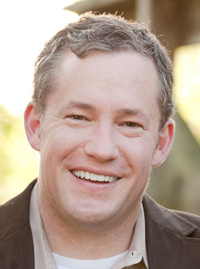Commentary: Breaking News!
Working in Washington D.C., I consume a lot of news. Over the past couple months, I feel like the amount has increased exponentially as I have found it difficult to avert my eyes from the nightly news coverage of the election primaries. It feels like a slow motion car crash and I can’t look away.
Recently, while I was watching CNN, my 5-year-old son came into the room and looked at the screen. There were talking heads prognosticating around a table, clips of violence from a recent political rally looping in the corner, and primary election results scrolling on the side. At the same moment I was considering how to explain this scene to him, he turned and asked, “What broke?” Pointing at the red banner, he said again, “It says something’s breaking.” I explained what was happening and the different meanings of the word “breaking.” But his question has stuck with me over the past several days as I now see the words “breaking news” everywhere. Given what is happening in our world today, it is an important question to ask ourselves. “What is broken?”
I’m not sure how to answer that question. I’m not sure what is broken, or how deep the fracture goes. Our political system is influenced so much by campaign finance and special interests. Deeply entrenched racist and classist values in our society are operating in plain sight. The two political parties seem more polarized, less civil, and more entrenched than ever. Protestors have been demonized, and violence has been not only excused, but extolled. But our political dysfunction seems to only be a symptom of a deeper social failure.
As many reports have noted recently, part of the problem is that we are isolated from one another –– from the traumas, experiences, news, and life of those different from us. We are disconnected socially from one another along race, class, educational, and political lines. The information we get from TV news outlets or Facebook articles operates more like a mirror than a window into our world. We are affirmed in our political and social view of the world, and are shocked at the news of millions of people who see the world so radically different. It becomes easier to demonize “the other” as the source of the problem, rather than seeing how we all contribute to that which is “broken” in our world, or the role we all must play in healing it.
For me, this Holy Week and Easter couldn’t come at a better time. I welcome the Holy Week call to reflect on our brokenness. I need to confess my own roles in the crowd –– at some moments waiving palms for Christ and at other times fearfully yelling, “Crucify Him!” I need to mourn the brokenness in myself and our world that too easily rejects love, and in our fragility, clings to what we think will provide safety and prosperity. Most of all, I need to be reminded again that even in our darkest moments, hope remains. Angry mobs extolling violence will not have the last word. There is Good News, In-Breaking News of hope and life triumphing over death. Love trumping violence.
So next time you see “Breaking News” flash across your screen, remember that our brokenness is not the end of the story. Another headline will assuredly follow. “Hosannah!”
Michael Neuroth is Policy Advocate for International Issues.
View this and other columns on the UCC’s Witness for Justice page.
Donate to support Witness for Justice through the Neighbors in Need offering.
Click here to download the bulletin insert.
Related News
It’s Time to Get into Good Trouble
On Tuesday, April 3, history was made by U.S. Senator Cory Booker who spoke on the Senate...
Read MoreReflections on a Christian Understanding of State and Government
The testimony of both the Hebrew and Christian scriptures as well as theological reflections...
Read More“What is Wrong with You People?”
I am writing this article from New York City as I engage with CSW, the United Nations...
Read More

